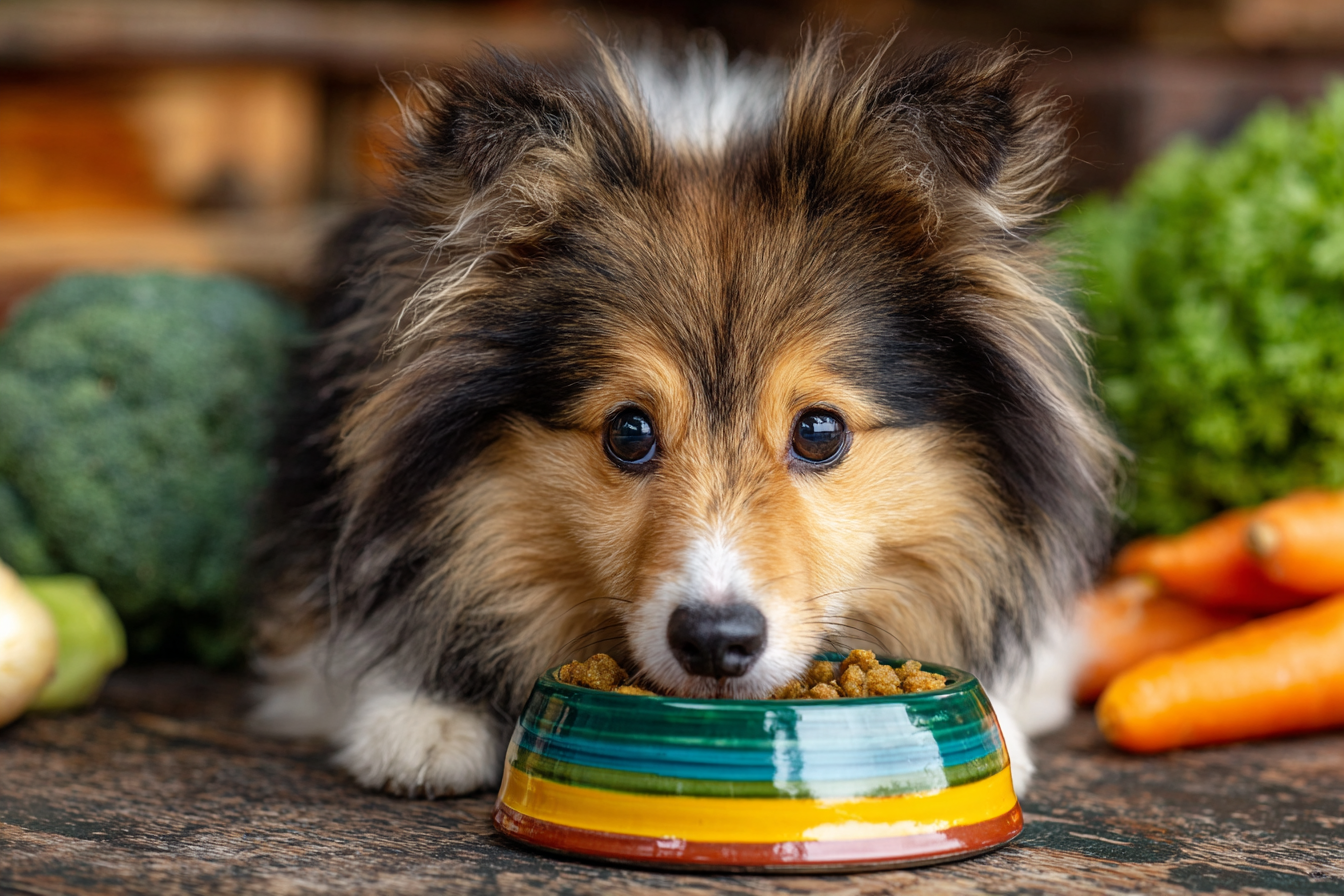Proper nutrition plays a vital role in maintaining the health, vitality, and longevity of your Shetland Sheepdog, also affectionately known as the Sheltie. This energetic and intelligent breed requires a carefully planned diet to support their active lifestyle and prevent common health issues. Understanding the optimal Shetland Sheepdog diet and nutrition can help you provide the best care possible, ensuring your Sheltie stays happy and healthy throughout all stages of life. In this guide, we’ll explore everything you need to know about feeding your Sheltie, from their nutritional needs to practical feeding tips and recommendations.
Nutritional Requirements for Shelties
Shetland Sheepdogs are medium-small herding dogs with a high energy level and an agile build. Their diet should be well-rounded, reflecting their activity and unique metabolic needs. At the core of their nutrition are three macronutrients: proteins, fats, and carbohydrates.
Proteins are especially important for muscle development and repair. Shelties benefit most from high-quality animal-based proteins like chicken, lamb, fish, and beef. Protein also supports their immune health and energy levels.
Fats provide a concentrated energy source essential for an active dog like the Sheltie. Healthy fats, such as omega-3 and omega-6 fatty acids, contribute to maintaining a shiny coat, promoting joint health, and supporting brain function.
Carbohydrates supply energy but should be easily digestible and not overly abundant. Whole grains, vegetables, and fruits provide essential vitamins, minerals, and fiber to support digestion.
In addition to macronutrients, vitamins and minerals, such as calcium, phosphorus, zinc, and antioxidants, help maintain bone strength, immune defense, and overall wellness.
Selecting Balanced Dog Foods
When choosing commercial dog food for your Sheltie, the goal is to find a product that meets all their nutritional requirements in a balanced and complete way. High-quality commercial diets formulated for small or active breeds are often the best options.
Look for these key factors in dog food labels:
- Adequate protein content: Ideally above 22% for adult dogs.
- Named animal protein sources: Ingredients such as “chicken,” “beef,” or “salmon” should be specified.
- Limited fillers and artificial additives: Avoid foods with too many by-products, fillers like corn or wheat, or artificial colors and preservatives.
- AAFCO approval: Ensures the food meets established nutrient profiles for maintenance or growth.
Wet, dry, or a combination of both can be used depending on your dog’s preferences, but dry kibble is beneficial for dental health.
Homemade Versus Commercial Diets
Some owners prefer preparing homemade meals for their Shelties to control ingredients and offer variety. Homemade diets can be healthy if carefully planned to ensure essential nutrients are included in the right proportions.
The primary challenge with homemade diets is achieving a balanced mix of protein, fats, carbohydrates, vitamins, and minerals. Consulting a veterinary nutritionist is recommended before switching to homemade food to avoid deficiencies or imbalances.
Commercial diets are formulated to meet all nutritional requirements conveniently and are extensively tested for safety and consistency. They are often preferable for busy pet parents or those unfamiliar with canine nutrition.
Portion Control and Feeding Schedules
Shelties have moderately high energy needs but are also prone to weight gain if overfed or sedentary. Portion control is essential to maintaining a healthy weight and preventing obesity-related health problems such as joint stress and diabetes.
The amount of food per day depends on your Sheltie’s age, weight, activity level, and metabolism. Generally, adult Shelties weighing between 15 to 25 pounds require ¾ to 1½ cups of high-quality dry food daily, split into two meals.
For growing puppies and highly active dogs, you might need to increase portions slightly, while older or less active Shelties may need smaller amounts.
Establishing a regular feeding schedule with consistent meal times not only helps digestion but also prevents begging and overeating.
Foods to Avoid and Allergy Awareness
While Shelties enjoy a variety of foods, certain items should be strictly avoided due to toxicity or digestive upset:
- Chocolate, caffeine, and alcohol: Highly toxic to dogs.
- Grapes and raisins: Can cause kidney failure.
- Onions and garlic: Damage red blood cells leading to anemia.
- Avocado: Contains persin which can be harmful.
- Excessive fatty or salty foods: Can trigger pancreatitis or dehydration.
Shetland Sheepdogs can be prone to food allergies or sensitivities, manifesting as itching, digestive upset, or ear infections. Common allergens include wheat, soy, corn, and certain proteins. If you notice symptoms, consult your vet to consider an elimination diet or allergy testing.
Supplements and Treats
While a balanced diet should provide all essential nutrients, some Shelties may benefit from supplements, particularly for joint health or coat condition.
- Omega-3 fatty acids: Found in fish oil, help reduce inflammation and improve skin and coat health.
- Glucosamine and chondroitin: Support joint function, especially as Shelties age.
- Probiotics: Aid digestion and bolster immune function.
Treats should be given sparingly and preferably be healthy and low-calorie options like small pieces of cooked meat, vegetables, or commercial dog treats formulated without fillers and artificial ingredients. Always factor treats into the daily caloric intake to avoid overfeeding.
Feeding Tips for Puppies Versus Adults
The nutritional needs of your Sheltie change drastically from puppyhood to adulthood.
- Puppies: Require food with higher protein and calorie density to fuel rapid growth and development. Feed puppy formulas specially designed for this stage, and divide meals into 3-4 servings daily to maintain energy levels and prevent hypoglycemia.
- Adults: Shift to maintenance diets with balanced protein levels and controlled fat content to maintain healthy weight and energy. Two meals per day are usually sufficient.
- Seniors: Older Shelties benefit from diets lower in calories but rich in antioxidants and joint-support ingredients. Monitor their intake closely to adjust for reduced activity.
Monitoring Weight and Diet Adjustments
Regularly monitoring your Sheltie’s weight and body condition is crucial to tailor their diet effectively. Use the body condition scoring system as a guide to assess whether your dog is underweight, ideal, or overweight.
Symptoms like lethargy, excessive hunger, or difficulty maintaining weight might indicate dietary issues or underlying health problems.
Always consult your veterinarian before making significant dietary changes or if you notice sudden weight fluctuations. Adjust portion sizes and exercise routines accordingly to keep your Sheltie in peak condition.
Expert Advice for Maintaining Your Sheltie’s Nutrition
Feeding your Shetland Sheepdog a diet that meets their unique nutritional needs is one of the best ways to promote a long, healthy, and active life. Remember:
- Choose high-quality, balanced dog food or carefully prepared homemade meals.
- Pay attention to portion control and avoid overfeeding.
- Keep treats healthy and limited.
- Be vigilant about food allergies and harmful foods.
- Adjust diets to match their life stage and activity level.
- Consult your veterinarian for personalized nutrition advice or if you have concerns.
With consistent attention to your Sheltie’s diet and nutrition, you can ensure your beloved companion stays energetic, happy, and healthy for years to come.







